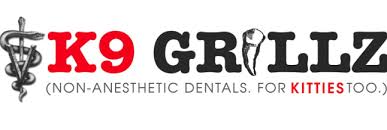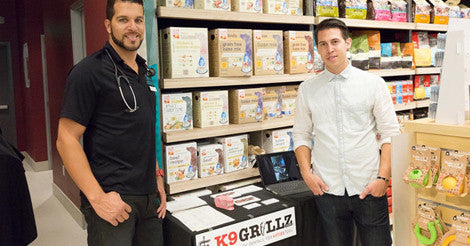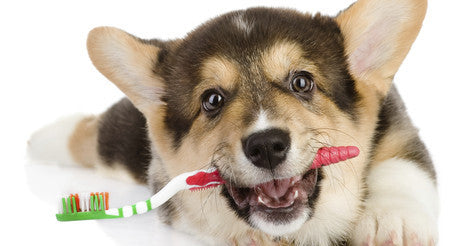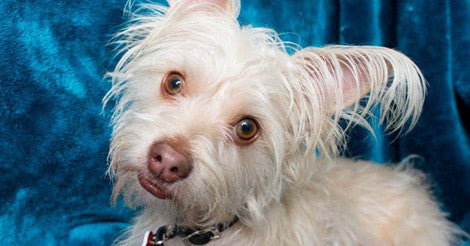It’s National Pet Dental Health Month so we’ve invited our long time partner Dr. Thomas of K9 Grillz to do a Q&A about the benefits of non-anesthetic teeth cleaning. Dr. Thomas has over 15 years of experience in veterinary medicine and is one of the most knowledgeable veterinarians in the field of anesthesia free dental cleanings.

What are the main differences between non anesthetic vs anesthetic teeth cleanings?
First I guess I have to say that I do not advocate anesthesia free teeth cleaning unless it is performed by K9 Grillz. I say this because unfortunately the field is inundated with people who do not have the proper training or are not operating with specific criteria or standards of care. I started this company to help promote animal welfare and health as well as to protect the animals from this negligence. When done properly and ethically as our company does, I believe we are able to achieve a dental prophylaxis (cleaning) that is equivalent to an anesthetic prophylaxis. We use all of the same equipment including hand instruments - scalers, probes, currettes, Ultra-sonic scalers, and mechanical polishers. Each dental is performed in a clean, quiet, safe environment with properly sterilized instruments and equipment.
Many veterinarians believe that non anesthetic dental cleaning is not as effective as anesthetic dental cleaning. Do you believe this is true?
To put it simply, I agree and disagree. I do understand why a lot of veterinarians do not believe in anesthesia free teeth cleaning because I used to share the same opinion. As I stated previously, there are almost no anesthesia free teeth cleaning services that I know of that are operating legitimately with a combination of appropriately trained staff and consistent direct veterinary supervision. So most veterinarians are seeing the aftermath of illegitimate operators who either do not know how to identify significant dental or periodontal disease or are simply overlooking it in the name of money. In these situations, I agree, these operations are dangerous and should be shut down. Thankfully the California Veterinary Medical Board has recognized these significant problems, have changed regulations and are working to dismantle these businesses. It is a slow task and the board is underfunded for an aggressive approach but I believe that K9 Grillz model is the future and is helping locally with this effort primarily through the education of each individual client we contact and by the thorough care we do provide for the patients.
My opinion wasn't swayed until I saw first hand that anesthesia free teeth cleaning can indeed be performed very effectively when performed on properly screened patient. Anesthetic dentals ARE required for various reasons including but not limited to extractions and advanced periodontal disease. There are absolutely situations that can only be properly addressed under anesthesia. This is why a veterinarian MUST be present to perform a thorough and complete oral and physical examination prior to every anesthesia free teeth cleaning to determine what treatment is best for the individual patient. Anesthesia free teeth cleaning is only effective when an animal has a relatively healthy oral status. In this situation we are basically performing the same procedure as you and I would have done at our dentist, scaling and polishing. However if we find any conditions that require anesthetic intervention, the animal must first have this properly addressed at their regular veterinarian. Once an anesthetic dental is performed the animal will be re-evaluated at a future date (usually 6 months after) for admittance into our anesthesia free teeth cleaning program.
What circumstances would require anesthetic teeth cleaning?
There is a wide variety of dental and periodontal abnormalities that can only properly be resolved with a patient under anesthesia. Some of these reasons include, significantly loose teeth, fractured teeth with pulp exposure, root fractures, severe gingivitis, deep pocketing, severe recession, certain furcations, abscesses, foreign bodies and so on. There are also limiting physical conditions some of which are, cervical spinal pain/disease, respiratory disorders, any condition that is causing physical pain/discomfort i.e. ear infections or severe arthritis etc. There are also animals that behaviorally will not tolerate the procedure or are aggressive. Fortunately we are able to help about 95% of dogs and cats from a behavioral stand point.
What are the benefits of non anesthetic dental cleaning?
There are many, many benefits to anesthesia free teeth cleaning. Anesthetic dentals are often cost prohibitive to owners. Unfortunately this can mean that some animals will go a life time never having their teeth cleaned and also afflicted with significant, potentially painful dental and periodontal disease. As doctors we know the absolute necessity of good oral health. Many systemic diseases can arise from a diseased mouth. When an animal has a constant low grade infection/gingivitis in it's mouth, its immune system is in a way weakened as it has to always fight this chronic condition. Numerous other systemic diseases are attributed to dental disease including certain heart, kidney, and liver diseases. Anesthesia free teeth cleaning is significantly more economical for the client and in turn opens the door for many owners to take effective preventative care of their animals which can potentially extend the animals lives as well.
Anesthesia is generally safe for healthy animals but it does also always carry a slight risk even in healthy animals. For animals with compromised systemic health that risk goes up i.e. cardiovascular, pulmonary, kidney or liver disease. I am of the opinion that it is always best to avoid anesthesia whenever possible.
With our method, we are able to detect dental issues that require anesthetic intervention and actually can often provide owners with photographic or video images of the effected areas. When an owner can actually see a fractured tooth, see how loose a molar is, see how inflamed gum tissue is etc, they will be much more likely to have the issue properly addressed in a timely manner which of course is best for their pet. Once these issues are addressed properly, hopefully we can provide preventative care for a lifetime and keep them from having to undergo anesthesia for dental issues in the future.

How often do you suggest that dogs get their teeth professionally cleaned?
We suggest that most of our patients have an anesthesia free teeth cleaning every 6 months. There are exceptions to this and at the time of a pets appointment we give the owner our recommendations for when they should schedule their next appointment. The single most important things we stress to our owners is home care between cleaning. The owners share in responsibility for their pets oral health. Can you imagine not brushing your teeth for 6 months? What that would feel like, taste like, smell like?
You recommend that people brush their dogs' teeth every day. But what if a dog doesn't allow you to brush his teeth? Are there alternatives to brushing?
Brushing is the single best thing you can do. A lot of disagreeable animals can over time become comfortable with brushing. It is of course best to start when animals are puppies or kittens although older animals can learn to tolerate it as well. Everyone involved must have patience with each other :) Aside from brushing, dental chews and rinses do help but again brushing is by far the most effective way to remove plaque.
What is your opinion on dental chews, sprays or wipes? Are they helpful? Do you recommend any particular brands?
They are definitely better then nothing I suppose but I do not have a particular affinity to any specific brand. I do not want people to get the idea that these are nearly as effective as brushing. They work best in conjunction with brushing. Again, I ask you to imagine only wiping or spraying your teeth for 6 months or even longer.
What breeds are most prone to dental disease? What extra steps do you recommend for people that own these breeds?
Toy and smaller breeds as well as brachycephalic (smush face dogs i.e. Pugs, Frenchies, Bostons etc) seem to be more predisposed to poor dentition. For these breeds especially, it is important to start taking care of their teeth from a young age. Start getting them used to brushing just like you would start to get them used to having their feet played with for nail trimming and so forth. Also the smaller and toy breed dogs should not partake in tug of war games with their owners or other dogs. Their tooth roots are shorter then larger breed dogs, their jaw bones are smaller which means there is not as much bone for the short roots to root in and their teeth can become loose easily by frequent tug of war games.
How did you come up with the idea of K9 Grillz? What sets you apart from other people offering the same services?
I came up with the idea for this company when I was asked by a friend to oversee an anesthesia free dental cleaning clinic they were having at their boarding facility. I realized that the service was indeed beneficial but not properly being addressed at most locations. I immediately realized that if we as veterinarians could standardize the procedure, it was a real way to help the overall health of many many animals who were not ever going to have their teeth cleaned due to prohibitive costs and risks of anesthetic dentals. I also like the idea of being able to perform this outside of a hospital as I believe it lowers the animals anxiety.
I believe that we have constructed a very strict set of criteria which we screen our patients against. I believe this affords the animals the absolute best care whether it be by anesthesia at their regular veterinarian or anesthesia free with us. Their are anesthesia free dental cleaning services at some locations that sub contract various veterinarians to oversee their clinic days but by doing so there is no guarantee of consistency of care. All veterinarians and all dental technicians that work for us are trained with the same standards of care and screen for the same criteria.
Another very important part to our service is our pre-check exam. Once the veterinarian performs their physical and oral exam each patient is then seen by one of our dental technicians for our "precheck" exam. The dental technician performs a very thorough examination of every tooth with instruments looking for any conspicuous problems the veterinarian may have missed. If found the veterinarian is alerted and the appropriate recommendations are then given to the client. The animal has to make it through both examinations to be admitted into our program. We are a team dedicated to truly giving the animal the absolute best of care.
And lastly, do you offer services for cats? Many dog owners also own cats. Can they also benefit from non anesthetic dental cleaning?
YES! We love cats! Cats absolutely benefit from teeth cleaning and proper oral health. We love them, please bring them to see us.
Thanks so much for the wonderful questions and feel free to contact us at anytime with any additional questions at k9grillz@gmail.com and visit our website at www.k9grillz.com for more information.



Comments (0)
There are no comments for this article. Be the first one to leave a message!